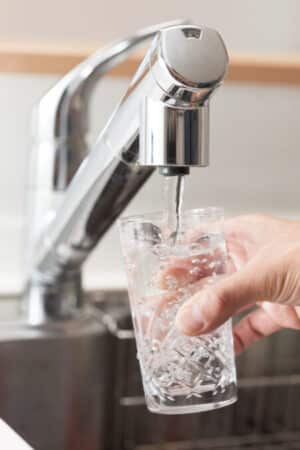Whole-home water filters boast the unique ability to treat all the water entering your Denver, CO, house. This ensures each of your faucets and spouts expels clean, fresh drinking water. These high-quality filtration systems come with many advantages, like convenience, easy installation, and endless health perks. However, it’s important to recognize how their potential drawbacks may impact your family and budget. Here’s everything you need to know about the pros and cons of installing a whole-home water filtration system.
Benefits of Whole-Home Filtration
Comprehensive, whole-home filtration systems are often more effective and reliable than point-of-use devices. Individual systems can only protect specific rooms or faucets. Point-of-entry systems, on the other hand, ensure all your drinking, cleaning, and bathing water is of the same high quality. A professional will install your whole-home system on your main water line so that every appliance has access to filtered water.
Water filtration systems are great at removing various contaminants, like heavy metals, chlorine, excess fluoride, and organic materials. Filtration is often highly recommended for those with well water systems to prevent arsenic and lead from entering the home. Even if you use city water, an extra line of defense could prove invaluable in tackling hard water and other water quality concerns.
These whole-home systems are also convenient and easy to use. They save you from having to constantly maintain your point-of-use systems or filter pitchers. You also won’t have to worry about your under-the-sink units taking up unnecessary storage space. After installation, whole-home systems only need annual professional maintenance to preserve their efficiency and health.
Contaminated water may carry an earthy, metallic, or chemical taste. You may also notice an unpleasant odor or visible floating particulates. Frequently using or consuming low-quality water can harm your skin as well as your immune system. Fortunately, filtered water is safer, cleaner, and better for your family’s long-term health.
Installing a whole-home system is one of the more cost-effective ways to control your water quality. These systems are cheaper than regularly replacing pitcher filters or buying bottled water. An eco-friendly, centralized filtration approach reduces how much you spend on monthly consumables. These systems can also help minimize your plumbing and appliance maintenance needs. With less debris in your water, you won’t have to worry about minerals accumulating in your pipes or faucets. Moderating your hard water is especially helpful in protecting your sinks and expensive machinery like your washing machine.
Issues with Whole-Home Filtration
Whole-home systems offer many amazing benefits, but it’s important to keep in mind their potential downfalls. For example, the initial installation cost can often be a hefty expense. This price depends on your chosen system and the necessary labor. The installation of a whole-home system is not a do-it-yourself project. To avoid costly mistakes and damage to your plumbing system, it’s best to rely on an experienced industry professional. While the initial investment may be expensive, it’s often offset over time by what you save in reduced maintenance and point-of-use filter costs.
Another disadvantage of these filters is their regular maintenance requirements. Whole-home filtration systems have average lifespans of around 10 to 20 years with professional care. Different systems have varying maintenance requirements depending on the type of internal filters they utilize. For instance, traditional sediment filters need replacing every six months, while micron filters can last up to a year. Your technician may also need to refresh your softener’s resin beads or switch out your ultraviolet bulbs. Maintenance is key to optimizing the system’s efficiency, but it increases the time and money you must invest in your water quality.
Don’t forget to consider the potential for increased water waste. Some filters, like those with backwash cycles, can waste several gallons of water for every clean gallon they produce. This is especially common with reverse osmosis filters, which typically wash away certain contaminants before they can build up in the system. Excessive water waste raises environmental concerns and can negatively impact your utility bills.
Other whole-house filtration concerns include the large amount of storage space they require in your basement or utility closet. They may also reduce your water pressure or flow. This is most likely to happen when the filters clog with sediment, decreasing the volume of water able to enter the home.
Types of Water Filtration Systems
To make the most of a whole-home filtration system, you need to choose the right one for your needs. For example, a sediment filter is best for households that are struggling with visible particulates. This filter will efficiently remove dirt, rust, sand, and more from your drinking water. Ion exchange filters, which are a type of water softener, are ideal for homes that have hard water. These systems will filter excess calcium and magnesium from your drinking water, replacing it with harmless sodium.
Activated carbon filters can take care of pesticides, organic materials, and chlorine. This type of filter specializes in improving taste, but it’s not useful against heavy metals like arsenic, copper, or lead. Ultraviolet filters use advanced lights to neutralize any viruses or bacteria in your water.
One of the most comprehensive systems you can invest in is a reverse osmosis filter. It can remove a significant range of pollutants, including bacteria, heavy metals, fluoride, and visible contaminants. However, this type of system also tends to be more expensive and requires more expert maintenance. Reverse osmosis filters are often installed as point-of-use systems, but you can increase their range to protect your whole home.
How to Limit Potential Drawbacks
Before choosing a filtration system, you should know what contaminants are in your water. Bring in a professional team to complete a full water quality test. Common pollutants found in city water include lead, pesticides, volatile organic compounds, chlorine, and calcium. If your water comes from a well system, your professional may test for iron, various sediments, organic pollutants, and sulfide.
Once you set your budget, your technician will walk you through the ideal system options for your desired water quality. Many affordable filtration options can effortlessly tackle your sediment or chemical concerns. Make sure your plumber keeps in mind the size of your plumbing system and your water pressure needs. Choosing the right filter for your home will ensure you don’t struggle with water flow issues.
You’ll also want to consider what care your system will need in the future. Cartridge-based filters typically require filter replacements every 6 to 12 months. Tank-based systems, on the other hand, use sturdy resins and media that can last up to a decade. Setting up a long-term maintenance plan will guarantee high water quality and peace of mind for years to come.
Trustworthy Denver Plumbing Company
Since 2012, [company_name] has prioritized delivering exceptional plumbing services in Denver. We strive to provide reliable communication and energy-efficient solutions that earn your complete satisfaction. Look to our skilled team to service your plumbing maintenance, repair, and installation needs. We’re experienced in camera inspections, gas line care, new pipe installation, and more. Call today to schedule an appointment today.


